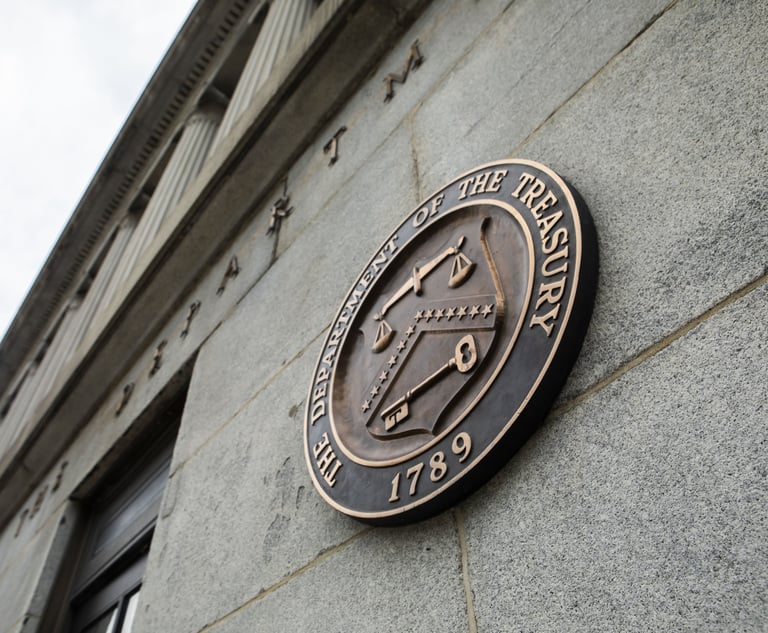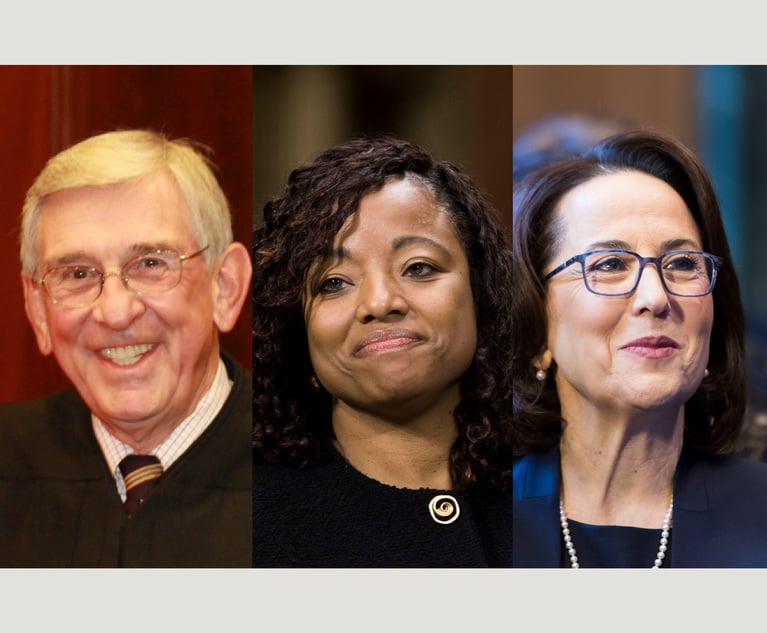 Chief Justice William Rehnquist (2003). Credit: Stacey Cramp
Chief Justice William Rehnquist (2003). Credit: Stacey CrampWhat Rehnquist Told Senators After 'Culture Shock' of Presiding at Clinton's Trial
"I underwent the sort of culture shock that naturally occurs when one moves from the very structured environment of the Supreme Court to what I shall call, for want of a better phrase, the more free-form environment of the Senate," Rehnquist said at the close of the Clinton impeachment trial.
January 16, 2020 at 05:52 PM
6 minute read
On the final day of the impeachment trial of President Bill Clinton, the presiding officer—Chief Justice William Rehnquist—offered a surprising message for the U.S. Senate. What will Chief Justice John Roberts Jr. say after the Trump impeachment trial ends?
Roberts, who took the presiding officer's oath on Thursday, is just beginning his constitutional duty in the Senate trial, and he is appearing in a chamber riven with partisan distrust. Rehnquist served in a markedly different environment in which the Republican Senate majority leader worked closely with the Democratic leader to reach consensus on rules and proceedings.
On the final day of the Clinton trial, after the vote on the second article of impeachment made clear that the president was acquitted, Rehnquist had something to say. "The chair wishes to make a brief statement, without objection, I trust." His remark prompted laughter from the senators.
In more words than he had used at any one time during the five-week trial, Rehnquist told the Senators before him:
More than a month ago, I first came to preside over the Senate sitting as the Court of Impeachment. I was a stranger to the great majority of you. I underwent the sort of culture shock that naturally occurs when one moves from the very structured environment of the Supreme Court to what I shall call, for want of a better phrase, the more free-form environment of the Senate.
I leave you now a wiser but not a sadder man. I have been impressed by the manner in which the majority leader and the minority leader have agreed on procedural rules in spite of the differences that separate their two parties on matters of substance.
I have been impressed by the quality of the debate in closed session on the entire question of impeachment as provided for under the Constitution. Agreed-upon procedures for airing substantive divisions must be the hallmark of any great deliberative body.
Our work as a Court of Impeachment is now done. I leave you with the hope that our several paths may cross again under happier circumstances.
Majority Leader Trent Lott introduced a resolution thanking Rehnquist for exhibiting "extraordinary qualities of fairness, patience, equanimity and wisdom."
 Trent Lott. Photo by Diego M. Radzinschi/ ALM
Trent Lott. Photo by Diego M. Radzinschi/ ALM
Lott told Rehnquist, "As our presiding officer during most of the last 5 weeks, you have brought to our proceedings a gentle dignity and an unfailing sense of purpose and sometimes a sense of humor. The majority leader realized when it was time to take a break and not to take a break when the Chief Justice said, 'Let's go forward.' By placing duty above personal convenience and many other considerations, you have taught a lesson in leadership."
Lott and then-minority leader Tom Daschle presented Rehnquist with the "Golden Gavel Award," a Senate tradition after someone has presided over the Senate for 100 hours. "I am not sure it quite reached 100 hours, but it is close enough," Lott said.
Rehnquist, who received a standing ovation, quipped: "It seemed like it."
|Challenges for Roberts
Rehnquist had few if any difficult moments during the Clinton trial. Controversial motions or questions, such as whether Monica Lewinsky should testify in person or whether depositions would be videotaped instead, were decided by the full Senate.
Roberts likely also would leave controversial motions to the Senate for a vote and instead rule on more traditional questions involving rules and evidence. Senate rules permit the full Senate to vote on decisions made by Roberts. The chief justice will be assisted by Senate Parliamentarian Elizabeth MacDonough; Jeffrey Minear, counselor to the chief justice; and one of his law clerks.
Rehnquist and Roberts, who clerked for the late justice, share one disarming tool—both men earned reputations for their quick wit, a tool that may be useful at tense moments in the Senate proceedings.
But Roberts' greatest challenge, given his concern that the Supreme Court not be viewed as a partisan institution, will be to ensure that the impeachment proceedings run fairly without devolving into the angry and super-partisan atmosphere that has marked current politics.
 U.S. Supreme Court Chief Justice John G. Roberts, center, walks to the Senate Chamber to be sworn in, as well as to swear in senators, at the start of the Trump impeachment trial Thursday. Credit: Diego M. Radzinschi / NLJ
U.S. Supreme Court Chief Justice John G. Roberts, center, walks to the Senate Chamber to be sworn in, as well as to swear in senators, at the start of the Trump impeachment trial Thursday. Credit: Diego M. Radzinschi / NLJ
That challenge comes at a time when the Supreme Court has three cases that involve Trump personally. The justices have agreed to decide whether Trump's taxes and other financial documents can be disclosed to an investigating grand jury and House committees. Arguments will be heard in the court's March session. The justices also have pending challenges to major Trump administration policies such as its attempt to end the delayed deportation of so-called Dreamers.
Roberts and Trump have feuded with each other, but never in person. Trump disparaged Roberts as a "nightmare" for conservatives after the chief was a key vote in upholding the Obama-era Affordable Care Act. Last year, Roberts rebuked Trump after he derided an "Obama judge" who had ruled against the Trump administration in an immigration case.
Roberts is the third chief justice to preside over a presidential impeachment. Chief Justice Salmon Chase presided over the Senate trial of President Andrew Johnson in 1868.
Unlike Rehnquist and Roberts, Chase had political experience before going on the bench: he was a former U.S. senator and U.S. Treasury secretary in the Lincoln cabinet. But Chase, who pushed for an active role in the impeachment proceedings, had no precedents to follow.
Roberts has the example set by Rehnquist, his former boss as a law clerk. The chief justice is likely to hew closely to his mentor.
NOT FOR REPRINT
© 2025 ALM Global, LLC, All Rights Reserved. Request academic re-use from www.copyright.com. All other uses, submit a request to [email protected]. For more information visit Asset & Logo Licensing.
You Might Like
View All

Corporate Disclosure Law Enjoys ‘Presumption of Constitutionality,’ Feds Tell Justices

Split 4th Circuit Revives Constitutional Challenge to Child Vaccine Mandate

Censorship or Security Measure? TikTok Ban Pits Civil Liberties Groups Against US Officials
Trending Stories
- 1People in the News—Jan. 8, 2025—Stevens & Lee, Ogletree Deakins
- 2How I Made Partner: 'Avoid Getting Stuck in a Moment,' Says Federico Cuadra Del Carmen of Baker McKenzie
- 3Legal Departments Dinged for Acquiescing to Rate Hikes That 'Defy Gravity'
- 4Spalding Jurors Return $12M Verdict Against State Farm Insurance Client
- 5Special Series Part 3: The Statutory Guardrails Violate the Majority Vote Rule
Who Got The Work
Michael G. Bongiorno, Andrew Scott Dulberg and Elizabeth E. Driscoll from Wilmer Cutler Pickering Hale and Dorr have stepped in to represent Symbotic Inc., an A.I.-enabled technology platform that focuses on increasing supply chain efficiency, and other defendants in a pending shareholder derivative lawsuit. The case, filed Oct. 2 in Massachusetts District Court by the Brown Law Firm on behalf of Stephen Austen, accuses certain officers and directors of misleading investors in regard to Symbotic's potential for margin growth by failing to disclose that the company was not equipped to timely deploy its systems or manage expenses through project delays. The case, assigned to U.S. District Judge Nathaniel M. Gorton, is 1:24-cv-12522, Austen v. Cohen et al.
Who Got The Work
Edmund Polubinski and Marie Killmond of Davis Polk & Wardwell have entered appearances for data platform software development company MongoDB and other defendants in a pending shareholder derivative lawsuit. The action, filed Oct. 7 in New York Southern District Court by the Brown Law Firm, accuses the company's directors and/or officers of falsely expressing confidence in the company’s restructuring of its sales incentive plan and downplaying the severity of decreases in its upfront commitments. The case is 1:24-cv-07594, Roy v. Ittycheria et al.
Who Got The Work
Amy O. Bruchs and Kurt F. Ellison of Michael Best & Friedrich have entered appearances for Epic Systems Corp. in a pending employment discrimination lawsuit. The suit was filed Sept. 7 in Wisconsin Western District Court by Levine Eisberner LLC and Siri & Glimstad on behalf of a project manager who claims that he was wrongfully terminated after applying for a religious exemption to the defendant's COVID-19 vaccine mandate. The case, assigned to U.S. Magistrate Judge Anita Marie Boor, is 3:24-cv-00630, Secker, Nathan v. Epic Systems Corporation.
Who Got The Work
David X. Sullivan, Thomas J. Finn and Gregory A. Hall from McCarter & English have entered appearances for Sunrun Installation Services in a pending civil rights lawsuit. The complaint was filed Sept. 4 in Connecticut District Court by attorney Robert M. Berke on behalf of former employee George Edward Steins, who was arrested and charged with employing an unregistered home improvement salesperson. The complaint alleges that had Sunrun informed the Connecticut Department of Consumer Protection that the plaintiff's employment had ended in 2017 and that he no longer held Sunrun's home improvement contractor license, he would not have been hit with charges, which were dismissed in May 2024. The case, assigned to U.S. District Judge Jeffrey A. Meyer, is 3:24-cv-01423, Steins v. Sunrun, Inc. et al.
Who Got The Work
Greenberg Traurig shareholder Joshua L. Raskin has entered an appearance for boohoo.com UK Ltd. in a pending patent infringement lawsuit. The suit, filed Sept. 3 in Texas Eastern District Court by Rozier Hardt McDonough on behalf of Alto Dynamics, asserts five patents related to an online shopping platform. The case, assigned to U.S. District Judge Rodney Gilstrap, is 2:24-cv-00719, Alto Dynamics, LLC v. boohoo.com UK Limited.
Featured Firms
Law Offices of Gary Martin Hays & Associates, P.C.
(470) 294-1674
Law Offices of Mark E. Salomone
(857) 444-6468
Smith & Hassler
(713) 739-1250










